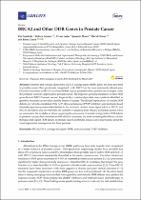| dc.contributor | Vall d'Hebron Barcelona Hospital Campus |
| dc.contributor.author | Nombela, Paz |
| dc.contributor.author | Lozano, Rebeca |
| dc.contributor.author | Aytes, Alvaro |
| dc.contributor.author | Mateo Valderrama, Joaquim |
| dc.contributor.author | Olmos, David |
| dc.contributor.author | Castro, Elena |
| dc.date.accessioned | 2019-05-20T07:44:44Z |
| dc.date.available | 2019-05-20T07:44:44Z |
| dc.date.issued | 2019-03-12 |
| dc.identifier.citation | Nombela P, Lozano R, Aytes A, Mateo J, Olmos D, Castro E, et al. BRCA2 and Other DDR Genes in Prostate Cancer. Cancers (Basel). 2019;11(3):e352. |
| dc.identifier.issn | 2072-6694 |
| dc.identifier.uri | https://hdl.handle.net/11351/4072 |
| dc.description | BRCA2; DDR; Prostate cancer |
| dc.description.abstract | Germline and somatic aberrations in DNA damage repair (DDR) genes are more prevalent in prostate cancer than previously recognized, with BRCA2 as the most commonly altered gene. Germline mutations in BRCA2 have been linked to poor prognosis when patients are managed under the protocols currently approved for prostate cancer. The impact of germline mutations in other DDR genes beyond BRCA2 remain unclear. Importantly, a quarter of prostate cancer patients identified as germline mutation carriers lack a family history of cancer. The clinical implications of somatic DDR defects are yet to be elucidated. Poly ADP-ribose polymerase (PARP) inhibitors and platinum-based chemotherapy have proven to be effective in the treatment of other tumor types linked to BRCA1 and BRCA2 alterations and several trials are currently evaluating their efficacy in prostate cancer. Here, we summarize the available evidence regarding the prevalence of somatic and germline DDR defects in prostate cancer; their association with clinical outcomes; the trials assessing the efficacy of new therapies that exploit DDR defects in prostate cancer and briefly discuss some uncertainties about the most appropriate management for these patients. |
| dc.language.iso | eng |
| dc.publisher | MDPI |
| dc.relation.ispartofseries | Cancers;11(3) |
| dc.rights | Attribution-NonCommercial-NoDerivatives 4.0 International |
| dc.rights.uri | http://creativecommons.org/licenses/by-nc-nd/4.0/ |
| dc.source | Scientia |
| dc.subject | Pròstata - Càncer- Aspectes genètics |
| dc.subject | ADN - Dany |
| dc.subject | ADN - Reparació |
| dc.subject.mesh | Prostatic Neoplasms |
| dc.subject.mesh | BRCA2 Protein |
| dc.subject.mesh | DNA Damage |
| dc.subject.mesh | DNA Repair |
| dc.subject.mesh | /genetics |
| dc.title | BRCA2 and Other DDR Genes in Prostate Cancer |
| dc.type | info:eu-repo/semantics/article |
| dc.identifier.doi | 10.3390/cancers11030352 |
| dc.subject.decs | neoplasias de la próstata |
| dc.subject.decs | proteína BRCA2 |
| dc.subject.decs | daño del ADN |
| dc.subject.decs | reparación del ADN |
| dc.subject.decs | /genética |
| dc.relation.publishversion | https://www.mdpi.com/2072-6694/11/3/352 |
| dc.type.version | info:eu-repo/semantics/publishedVersion |
| dc.audience | Professionals |
| dc.contributor.organismes | Institut Català de la Salut |
| dc.contributor.authoraffiliation | [Nombela P] Prostate Cancer Clinical Research Unit, Spanish National Cancer Research Center, Madrid, Spain. [Lozano R, Olmos D] Prostate Cancer Clinical Research Unit, Spanish National Cancer Research Center, Madrid, Spain. CNIO-IBIMA Genitourinary Cancer Research Unit, Institute of Biomedical Research in Malaga (IBIMA), Málaga, Spain. [Aytes A] Programs of Molecular Mechanisms and Experimental Therapeutics in Oncology (ONCOBell), and Cancer Therapeutics Resistance (ProCURE), Catalan Institute of Oncology, Bellvitge Institute for Biomedical Research, L'Hospitalet de Llobregat, Spain. [Mateo J] Vall d'Hebron Institut d'Oncologia, Barcelona, Spain. Hospital Universitari Vall d'Hebron, Barcelona, Spain. [Castro] Prostate Cancer Clinical Research Unit, Spanish National Cancer Research Center, Madrid, Spain. Medical Oncology Department, Hospital Universitario Quironsalud Madrid, Madrid, Spain. |
| dc.identifier.pmid | 30871108 |
| dc.rights.accessrights | info:eu-repo/semantics/openAccess |

